
[Hide]
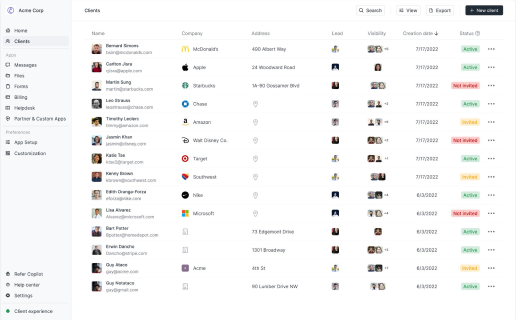
Accountants run on Copilot
Differentiate your accounting business with white-label portal that gives your clients a one-stop shop to access dashboards, submit tickets, send messages, make payments, and more.
4.9 rating
A couple years ago, I went to a networking event where I heard the Chief Revenue Office of Stripe say something that changed the way I thought about client work.
He said, “At Stripe, we aim to make our customers more successful this year than they were last year.”
It sounds so simple.
But what I took from this is that it is your duty to make sure your clients and customers make (or save) more money every year that you work with them. This is how you build client retention, and this is how you build a lasting and fruitful business.
When it comes to running an accounting or bookkeeping practice, this means you need to save your clients time, money, and headaches. And you need to do it so well that they want to keep working with you every time tax season rolls around.
But to do this, you need to have a cohesive client experience. One that not only delivers a great service, but that also pays attention to how your clients feel when interacting with you.
And the best way to make your clients feel special is to show them you care enough to be organized and give them a “home” where they can log into and see all of their interactions with you.
This is where a client portal for accountants comes into play.
So in this article, I’m going to explain what an accounting client portal is, what to look for when browsing from one, and I’ll also give you a list of my favorite ones (and why).
Alright, let’s get started.
What is an accounting client portal?
An accounting client portal is a platform accountants use to run and manage their client operations. It helps you create dedicated workspaces for each client you work with. This not only enhances the overall experience for your client (because they can log into their own dashboard any time), but it also helps you stay organized and connect all of your existing tools, like QuickBooks or invoicing.
What generally happens today is that accountants use a separate platform for billing clients, a separate platform for communication (usually email, which is not the most secure), and a separate platform for sending (and receiving) sensitive documents.
It can all feel disjointed and unorganized. And there’s also a security threat, given you’re most likely dealing with tax documents with SSNs and EINs attached to them.
And the benefit of using a client portal tool is that it brings all of this into one secure place. And I highly recommend that every accountant selling services take them seriously. That’s why I wrote this article, to help you find a handful of different platforms you can use (there’s a lot) and to know which ones will best fit your needs and stage in your business.
So before I get into the list of the favorite client portal for accountants, I want to go over what you should keep in mind when evaluating these tools.
What to look for in an accounting client portal
When finding a client portal to use for your accounting business, it’s important to not just blindly pick a tool someone recommends online. I know you already know this, but I think it’s important to know what you should be looking for. So let’s go over that real quick.
Here’s what you should look for in an accounting client portal:
- Secure data transfers: Financial data is very sensitive information. Whatever platform you choose, make sure they mention that everything from your clients’ tax returns and documents they send you can be encrypted and safe from hackers or data breaches.
- Secure messaging: This goes into the one above, but make sure the platform you choose also has some sort of built-in messaging system where you can chat back and forth with your clients in a secure environment (outside of just email).
- Easy invoicing and recurring payments: Most of these platforms have some sort of billing and invoicing feature built in. But you want to make sure that you find a platform that can also track hours (if that’s how you build) and also has the ability to set up recurring subscription payments. This way, you’re not constantly chasing down unpaid invoices.
- An amazing client experience: The best way to have strong client retention is to focus on your client experience. This is more than just you filing taxes or doing work for them. It also means that your client feels comfortable and excited to work with you. If you give clients a dedicated client portal that looks sleek and modern, your perceived value will go up compared to other accounting firms who are stuck with platforms that look like they were designed in 1998.
- The ability to create service packages: Productized services are a huge opportunity right now. Ideally, the platform you use can help you set up dedicated pricing packages that your potential clients can directly purchase on your website. It’s also a great way to upsell any add-on services from your existing clients.
I can list out a bunch more, but I believe these are the core ones to pay attention to. Okay, now let’s go over our list of the best client portals for accountants.
13 best client portal platforms for accountants in 2025
Here are the best client portals for accountants:
Let’s go over each of them in-depth.
1. Copilot

- Best for: Building modern client experiences
- Pricing: Starts at $39 per month
I've been using Copilot for a while now, and it's what I recommend to an accounting firm (or really any service provider) that has a bunch of tools that aren’t connected to each other.
At its core, Copilot is an all-in-one solution for client communication, payments, file-sharing, forms, contracts, help desks, and more. The platform serves many of the core needs of accounting firms like:
- Secure messaging (no more emailing SSNs back and forth)
- Document sharing with secure encryption
- SOC 2 Type II certified, plus HIPAA, GDPR, and CCPA compliant
- E-signatures for engagement letters
- Direct billing through Stripe (invoices + subscriptions)
- White-label portals to match your client’s brand (or your brand)
- Integrations with third-party apps (like QuickBooks, Xero, etc.)
- Automation features
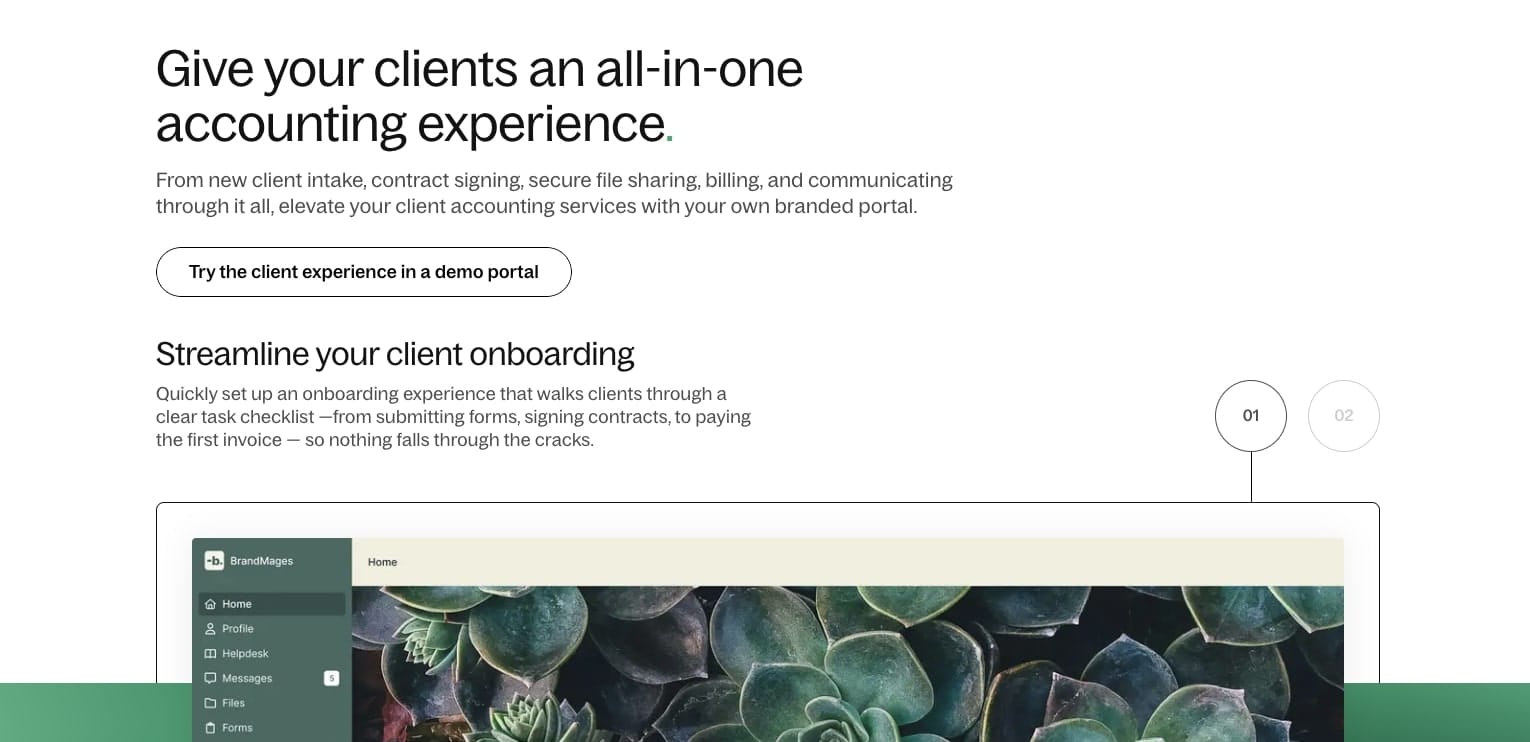
In Copilot, you can also set up workflows where new clients automatically get onboarding checklists, contracts, and intake forms. All without you doing anything.
The App store feature is really cool too. You can embed QuickBooks, Xero, or whatever tools you're already using right into the client's dashboard. They see everything in one place. You don't have to learn new software.
Jason Staats, founder of Jason on Firms, is also a fan of the platform. You can watch to see how he sets up his Copilot portal for accounting:
Copilot pricing
Pricing is always an important part of any business. Here are Copilot’s pricing plans:
- Starter: Starts at $39 per month (billed annually), includes 50 clients and 100 automations
- Professional: Starts at $149 per month (billed annually), includes 500 clients and 1,000 automations
- Advanced: Starts at $399 per month (billed annually), includes unlimited clients and automations
- Enterprise: Custom pricing that includes unlimited everything along with hands-on support
If you want to learn more about what each plan offers, you can check out Copilot’s pricing page here.
Copilot rating and reviews
Here’s how users rate Copilot on third-party review sites:
- G2: 4.8/5 star rating (from +252 reviews)
- Capterra: 4.9/5 star rating (from +30 reviews)
2. Karbon
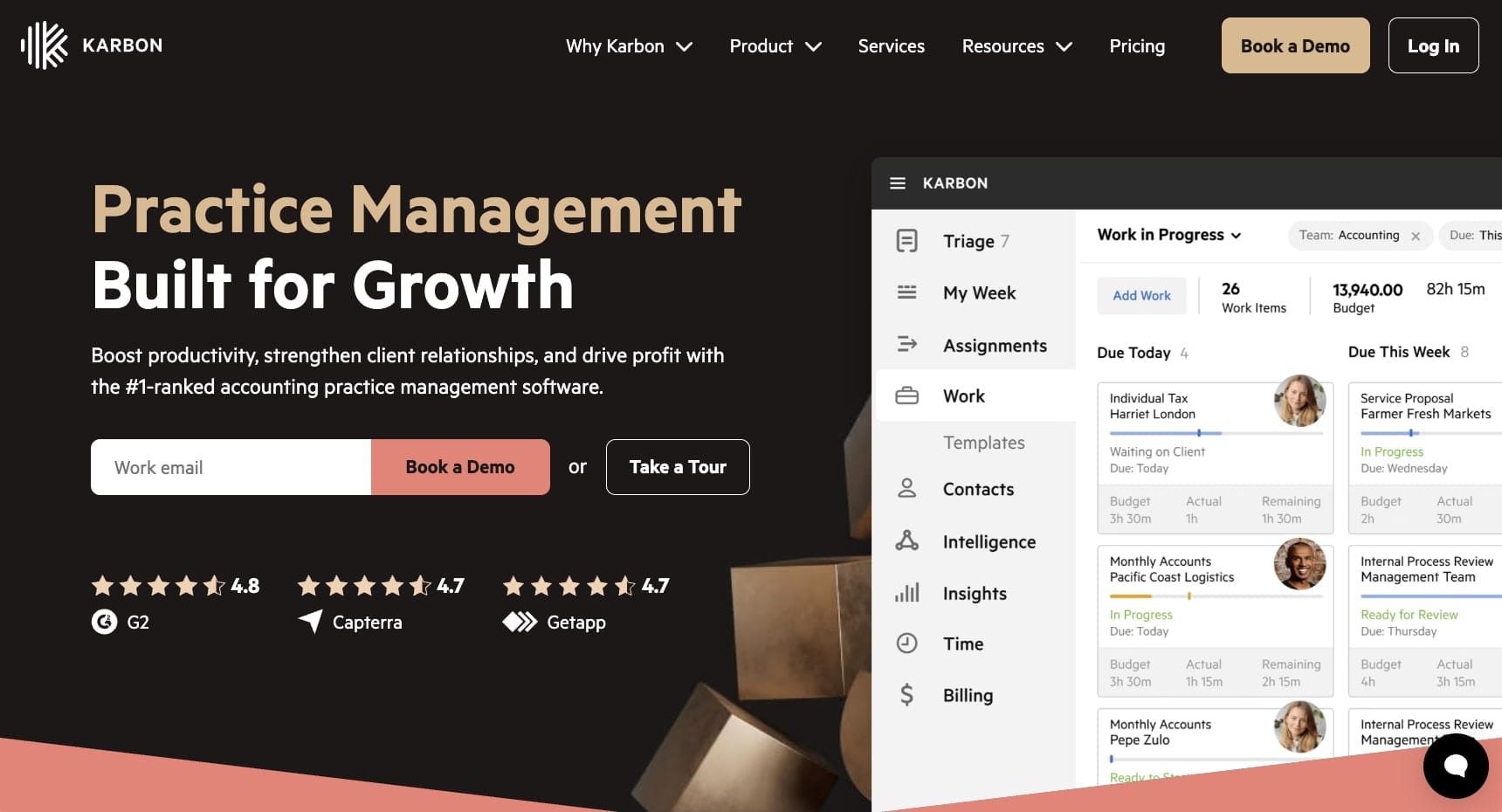
- Best for: Small-medium sized tax firms
- Pricing: Starts at $59 per month
Karbon is a practice management software for accounting firms. Founded in 2014, the platform has slowly grown to a trusted tool for many firms. It’s a great tool if you’re focused specifically on tax services.
Here are some of the core features of Karbon:
- Client portals that bring communications and payments in one place
- Document management for simplifying client document requests and collection
- Project management features that can replace your CRM
- Email management features with automatic audit trails
- iOS and Android app
The platform is very similar to Copilot and Canopy (which is also on this list). But unlike Copilot, they don’t give you the opportunity to test run the platform on your own. You have to book a demo with them to start.
Overall, Karbon is a trusted tool for many accounting firms. And there are a lot of competitors to the platform as well.
Karbon pricing
Here are Karbon’s pricing plans:
- Team: Starts at $59 per month (billed annually), includes 1,000 contracts
- Business: Starts at $89 per month (billed annually), includes 2,000 contacts
- Enterprise: Custom pricing that includes unlimited everything along with support from a dedicated Karbon employee
If you want to learn more about what each plan offers, you can check out Karbon’s pricing page here.
Karbon rating and reviews
Here’s how users rate Karbon on third-party review sites:
- G2: 4.8/5 star rating (from +669 reviews)
- Capterra: 4.7/5 star rating (from +187 reviews)
3. SmartVault
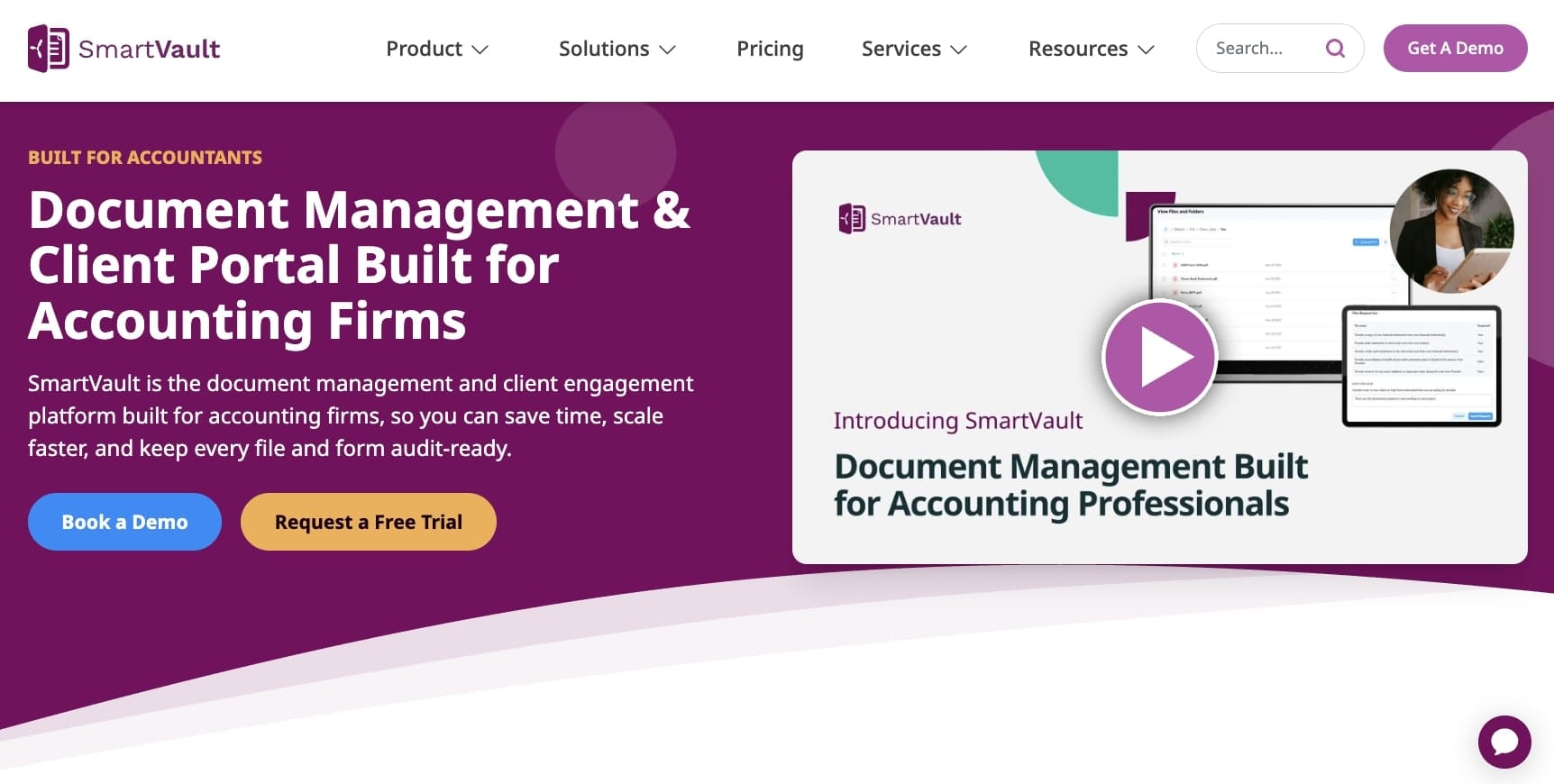
- Best for: Solo tax preparers
- Pricing: Starts at $50 per month
SmartVault is a practice management platform used by accounting firms, law firms, and healthcare providers. Pretty much anyone that has a physical practice.
The advantage of SmartVault is that, for accounting firms, it gives you really advanced document management. It's built for accountants who deal with a lot of paperwork and need everything organized by client, year, and document type.
The platform integrates directly with tax software like Lacerte, ProSeries, and Drake. So when you're done preparing a return, it automatically saves to the right client folder and you don’t need to manual upload anything.
What I like about SmartVault:
- Auto-syncs with QuickBooks and most major tax prep software
- Clients get their own portal to upload W-2s and 1099s
- Built-in e-signatures for 8879s and engagement letters
- Automatic document retention policies
The only downside is that the UX (user experience) can feel more like a digital filing cabinet than a modern client experience. If you're just looking for secure document storage and don't care much about how it looks to clients, SmartVault works great. But if you want something that actually impresses clients when they log in, you might want to look elsewhere.
For more details on how SmartVault works for accounting firms, check out their accounting solutions page. If you're considering alternatives, I wrote up a SmartVault alternatives guide and a direct Copilot vs SmartVault comparison that might help.
SmartVault pricing
Here are SmartVault’s pricing plans:
- Business Pro: Starts at $50 per month, includes unlimited clients
- Accounting Pro: Starts at $55 per month, includes integrations with your accounting tech stack
- Accounting Unlimited: Starts at $75, includes unlimited eSignature requests
There are a lot of features in each plan, so if you want to learn more you can check out their pricing page here.
SmartVault rating and reviews
Here’s how users rate SmartVault on third-party review sites:
- G2: 4.3/5 star rating (from +101 reviews)
- Capterra: 4.3/5 star rating (from +136 reviews)
4. Canopy
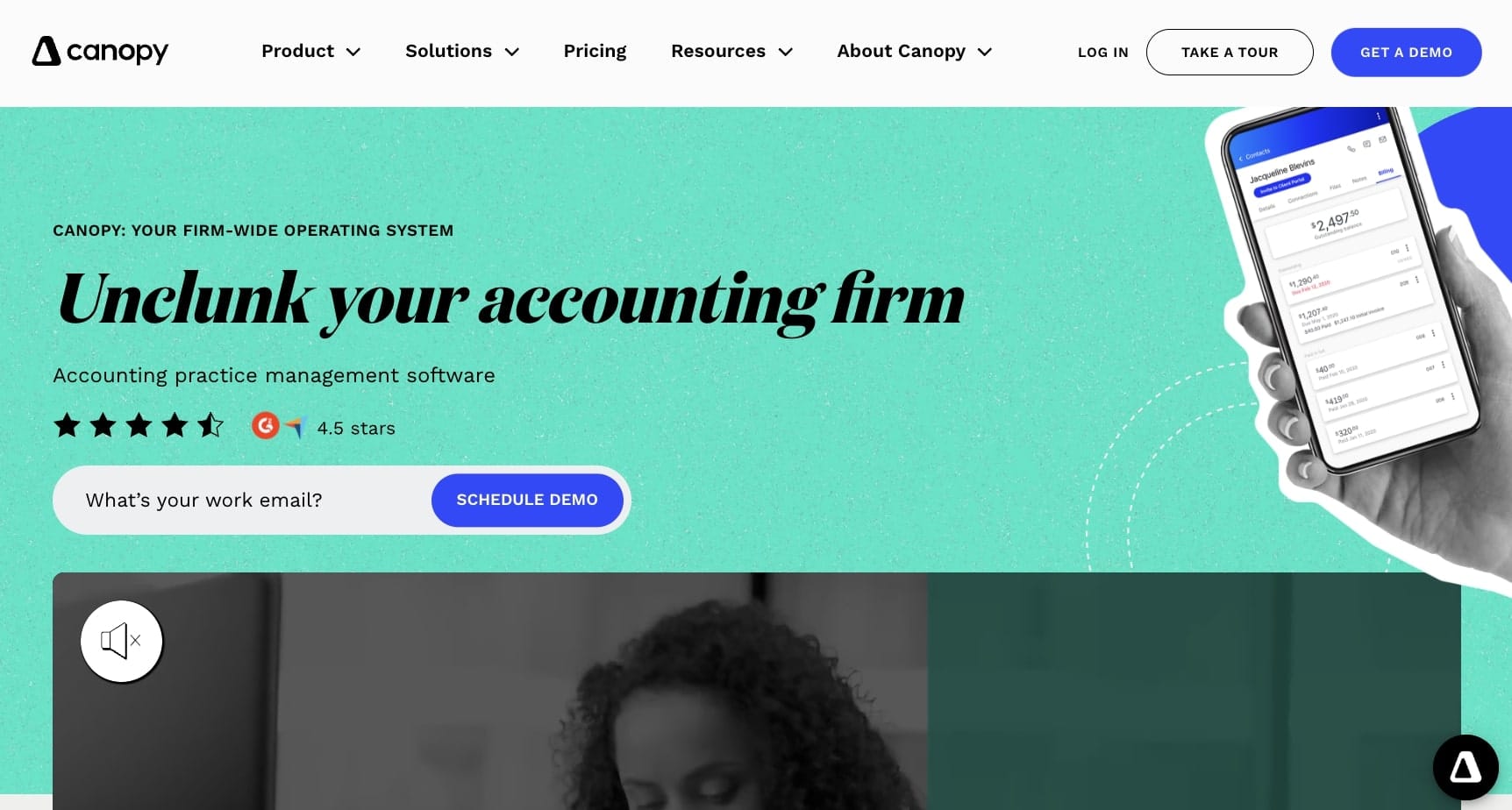
- Best for: Medium-large tax firms
- Pricing: Starts at $45 per month
Canopy tries to be the all-in-one operating system for accounting firms. And honestly, for tax-focused practices, they do a pretty good job.
The platform was built by accountants for accountants, which shows in features like their IRS transcript pulling tool. You connect your credentials once, and Canopy automatically downloads transcripts directly into client files.
What Canopy does well:
- Pull IRS transcripts directly into the platform
- Pre-built tax resolution templates for notices and letters
- Document management that actually understands tax year organization
- Time tracking that integrates with invoicing
- Modular pricing so you only pay for what you use
It does, however, feel like enterprise software. The interface is functional but not exactly what you'd call “modern.” Your clients might feel like they're logging into their company's HR portal.
Also, their pricing structure gets confusing fast. You start with a base "Client Engagement Platform" and then add modules like workflow, billing, and tax resolution. By the time you add everything you actually need, you're looking at way more than that $45 starting price.
For more details on Canopy's full feature set and their modular pricing structure, check their site. If you're considering alternatives, I wrote up a detailed Canopy alternatives guide that might help.
Canopy rating and reviews
Here’s how users rate Canopy on third-party review sites:
- G2: 4.6/5 star rating (from +460 reviews)
- Capterra: 4.5/5 star rating (from +232 reviews)
5. Moxo
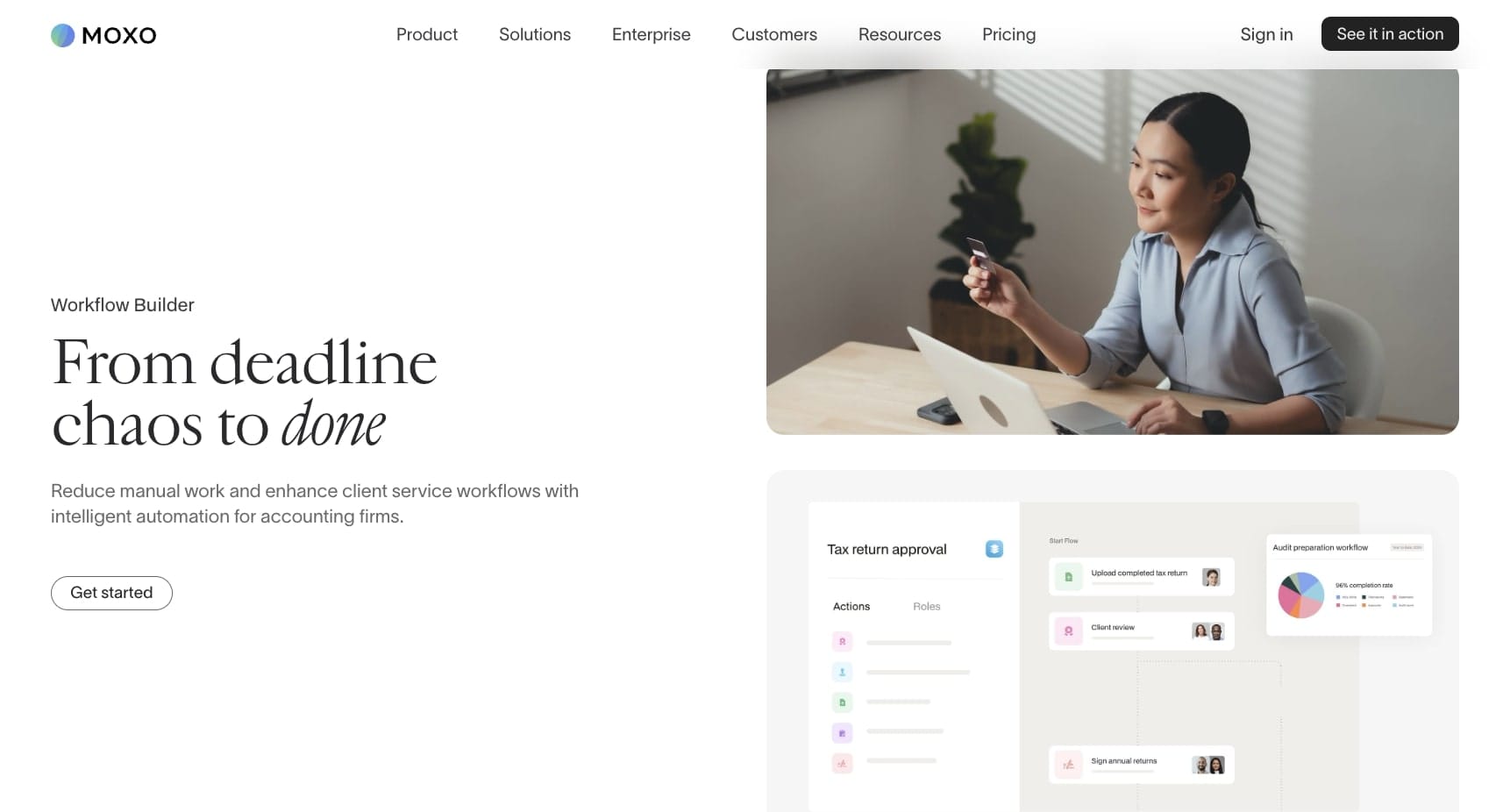
- Best for: Enterprise accounting firms
- Pricing: Need to contract sales
Moxo positions itself as the "workflow orchestration platform" for accounting firms. Which is just a fancy way of saying they help you automate client processes.
The platform was clearly built for bigger firms that deal with complex, multi-step workflows. Think audit prep, tax filings with multiple stakeholders, or compliance-heavy processes that need detailed audit trails.
What Moxo does well:
- Workflow automation that actually handles complexity (branching paths, conditional logic)
- SOC 2 Type II certified with detailed audit trails for everything
- Built-in AI features for suggested responses and automated nudges
- Video meetings built right into the platform
- Integrates with QuickBooks, Xero, and other accounting tools
The platform feels enterprise-y. If you're a smaller firm, you might find yourself overwhelmed by features you'll never use. And that starting price quickly increases when you add more users or storage.
For firms needing serious workflow automation, their accounting client portal handles complex tasks well. But if you're looking for something simpler, check out my Moxo alternatives guide for options for smaller firms and individual practitioners..
Moxo pricing
Moxo has three plans:
- Business
- Business Pro
- Enterprise
However, they don’t publicly display their pricing online. You have to make an account first or contact their team. To respect their privacy, I won’t be listing their pricing that is behind their sign up flow.
You can check out their pricing page for more information.
Moxo rating and reviews
Here’s how users rate Moxo on third-party review sites:
- G2: 4.5/5 star rating (from +186 reviews)
- Capterra: 4.1/5 star rating (from +24 reviews)
6. TaxDome
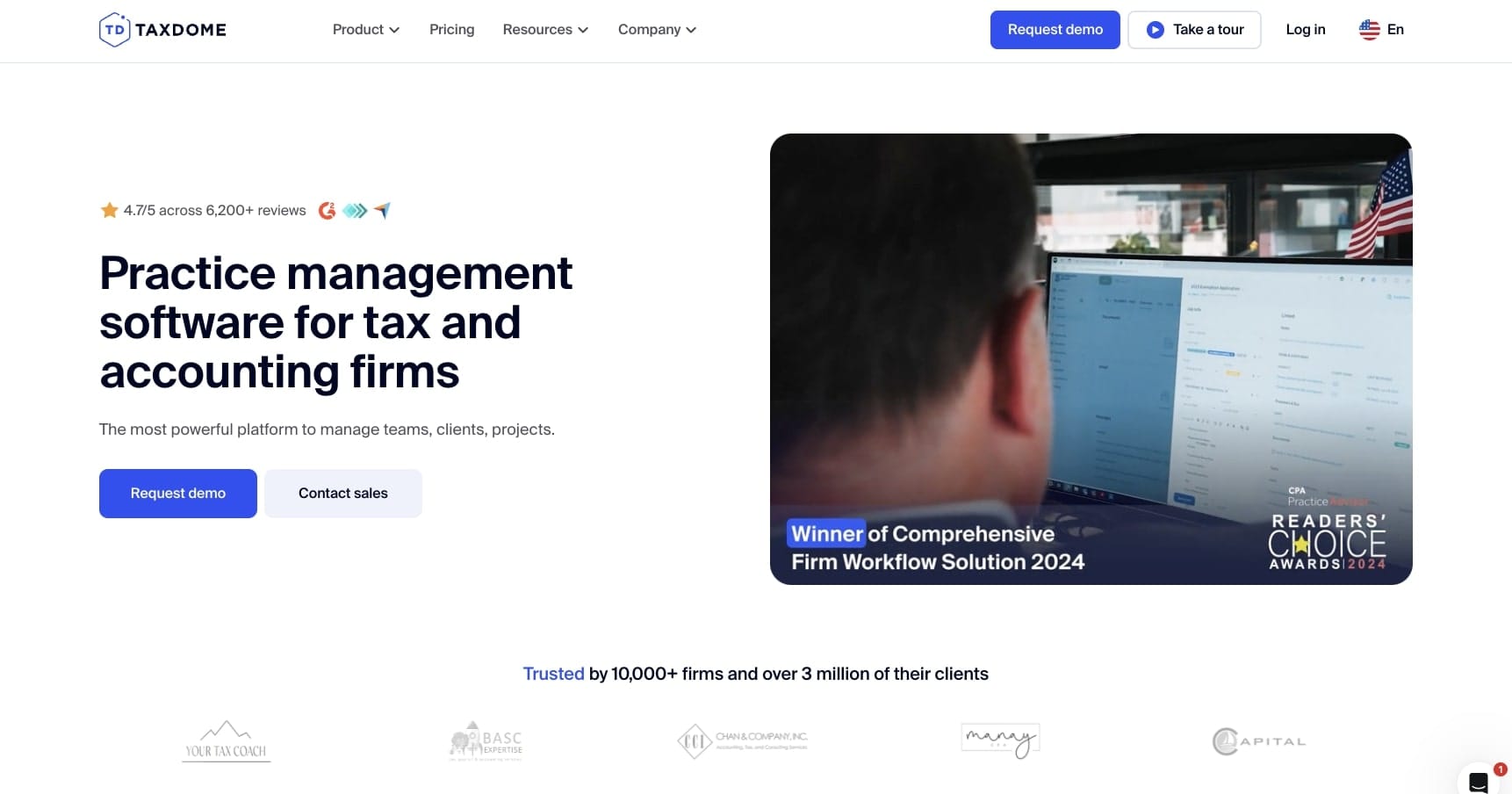
- Best for: Accounting firms focused on automation
- Pricing: Starts at $800 per year
TaxDome is another tool similar to Karbon and Canopy in that it’s for tax professionals, built by tax professionals. And it shows, in both good and weird ways.
The platform runs on "pipelines" that are essentially visual workflows where you drag client jobs through different stages. You set it up once, and TaxDome automates everything from task assignments, client reminders, document requests, and even invoice generation.
What TaxDome is good at:
- IRS transcript pulling built right in
- Conditional automations that handle different client types differently
- White-label portal with a solid mobile app
- Pre-built templates for tax returns, bookkeeping, payroll
- Everything included in one price
But the weird thing is you have to commit to at least a year upfront. There is no monthly option at the moment). So if you want to test out the platform, you're either all in or you're out. Not sure why they set it up like this.
As mentioned earlier, the platform is very similar to Karbon in a lot of ways. I wrote a comparison between TaxDome vs Karbon if you want to check that out. But overall, TaxDome is a fairly solid platform. Just check out the reviews and ratings below.
TaxDome pricing
Here are TaxDome’s pricing plans:
- Essentials: $800/year (solo users only, drops to $700/year with 3-year commitment)
- Pro: $1,000/year per user (drops to $900/year with 3-year commitment)
- Business: $1,200/year per user (drops to $1,100/year with 3-year commitment)
All plans include unlimited clients and storage. The Pro plan adds AI features and team collaboration. Business gets you white-label mobile apps and premium support. Check their pricing page for all the details.
TaxDome rating and reviews
Here’s how users rate TaxDome on third-party review sites:
- G2: 4.7/5 star rating (from +646 reviews)
- Capterra: 4.7/5 star rating (from +3,484 reviews)
7. Bonsai
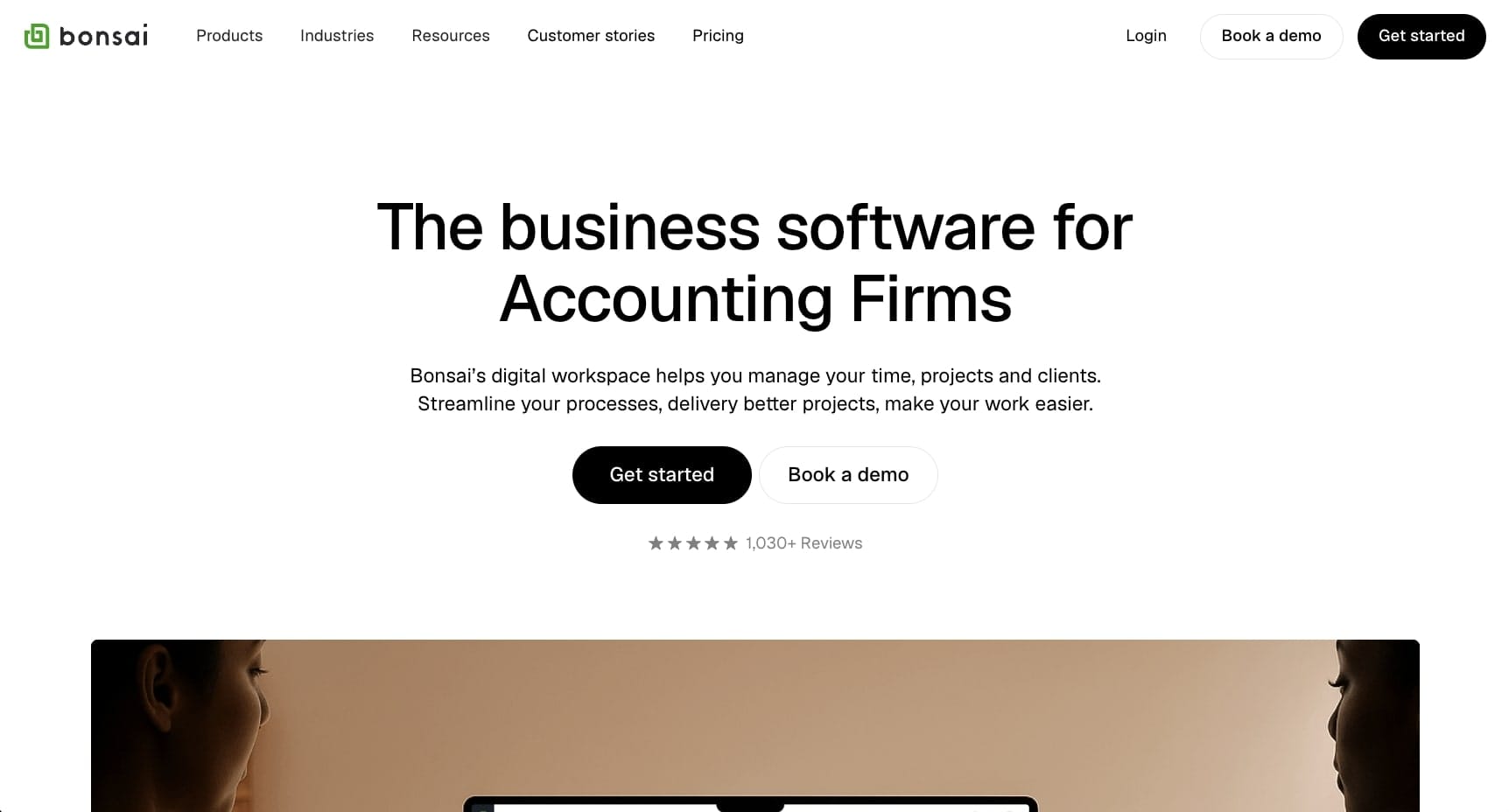
- Best for: Solo practitioners and freelancers
- Pricing: Starts at $15 per month
Bonsai is the first platform I used when I started my service business. And honestly, it's still a solid choice for freelancers just getting started.
Similar to Copilot, the platform can handle everything from a CRM, proposals, contracts, invoicing, project management, and time tracking. It's great if you’re a freelancer or solo practitioner just starting your business.
Here’s what I like about Bonsai:
- Templates for everything (proposals, contracts, invoices that actually look professional)
- Payment processing and invoicing
- Time tracking that automatically turns into invoices
- Expense tracking for tax deductions
- A decent mobile app for managing payments and time tracking
However, the interface can feel cluttered at times. Especially when you're just trying to send a simple invoice. And while they have a "client portal," it's pretty basic compared to dedicated portal solutions.
These two reasons are why I ended up switching to Copilot as my preferred platform.
Bonsai pricing
Here are Bonsai’s pricing plans:
- Basic: $15/month per user (projects, time tracking, basic CRM)
- Essentials: $25/month per user (adds proposals, contracts, scheduling)
- Premium: $39/month per user (adds client portal, custom branding)
- Elite: $59/month per user (adds automations, integrations with HubSpot/Xero)
All plans come with a 7-day free trial. You can also save about 20% if you pay annually. Check out their pricing details or my Bonsai alternatives guide if you want something more focused.
Bonsai rating and reviews
Here’s how users rate Bonsai on third-party review sites:
- G2: 4.3/5 star rating (from +102 reviews)
- Capterra: 4.6/5 star rating (from +92 reviews)
8. Dubsado
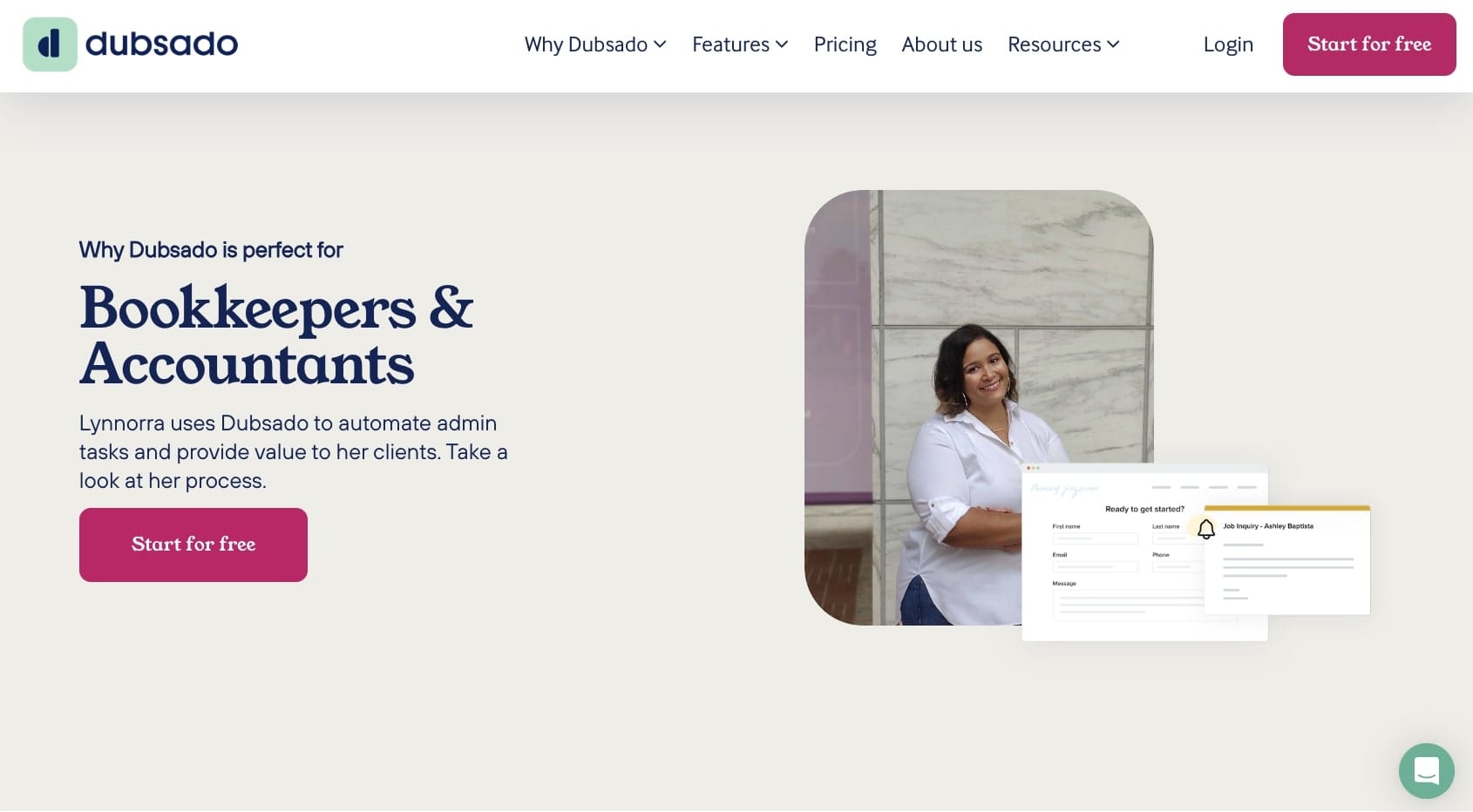
- Best for: Creative freelancers
- Pricing: Starts at $20 per month
Dubsado is a platform that has been around for a while, and I find myself recommending it at times.
The big selling point is customization. You can customize pretty much everything from forms, proposals, contracts, invoices, even your client portal. If you care about having everything match your brand perfectly, this is definitely a platform to look into.
Here’s what Dubsado does well:
- Beautiful, customizable proposals that actually convert
- Automated workflows that handle the entire client journey
- Unlimited clients and projects (even on the starter plan)
- Forms that actually look good on mobile
- Affordable for people on a tight budget
The only thing is the platform can feel a bit clinky. And if you're not tech-savvy, this might not be for you. But if design is not a big deal for you, this is a platform to look into.
Dubsado pricing
Here are Dubsado’s pricing plans:
- Starter: $20/month (unlimited projects & clients, invoicing, forms)
- Premier: $40/month (adds scheduling, automated workflows, Zapier)
You can save about 20% if you pay annually ($200/year for Starter, $400/year for Premier). They offer a free trial as well, which is nice for testing it out.
Dubsado rating and reviews
Here’s how users rate Dubsado on third-party review sites:
- G2: 4.3/5 star rating (from +72 reviews)
- Capterra: 4.2/5 star rating (from +57 reviews)
9. HoneyBook
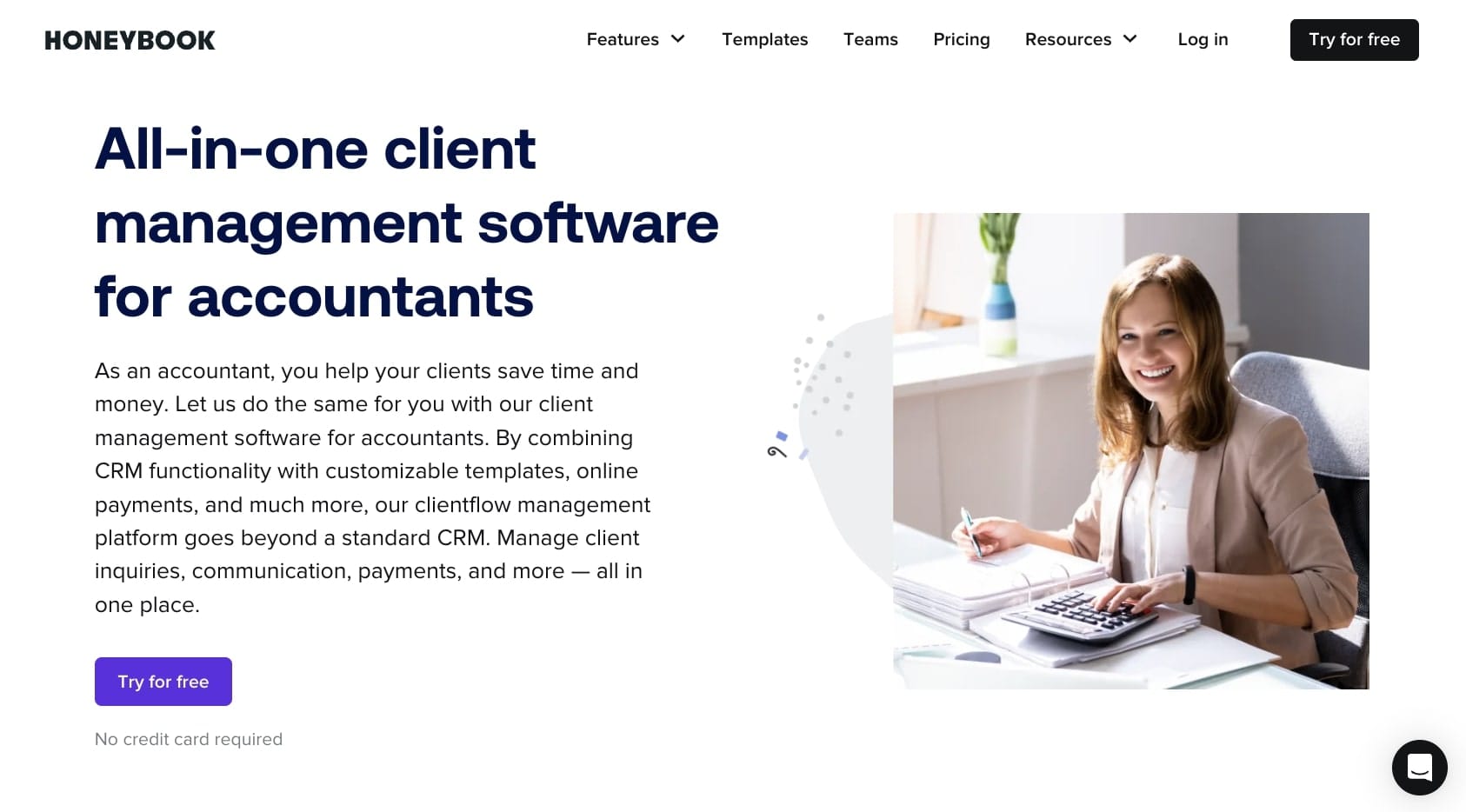
- Best for: Accountants who need simple invoicing
- Pricing: Starts at $36 per month
HoneyBook has been around forever, it was originally used mainly by wedding photographers. However, the platform has expanded to also now include accounting firms.
The platform focuses heavily on the entire client experience lifecycle, from the first inquiry to final payment. Everything flows together smoothly. You can send a proposal that turns into a contract, which turns into an invoice, and ultimately gets you paid.
What HoneyBook does well:
- Beautiful, conversion-focused proposals and brochures
- Smart automations that actually work (follow-ups, reminders, workflows)
- QuickBooks integration that syncs seamlessly
- Scheduling that clients actually use
- SMS reminders for payments and appointments
The only downside is that it doesn’t have advanced accounting features like IRS transcript pulling, tax-specific workflows, and the kind of document organization accountants may need. The portal is nice and the payments are nice too. So if you simply invoicing and management, this should be an option.
The platform is very similar to Bonsai in that regard, so if you're weighing it against Bonsai, I wrote a detailed comparison you can check out that might help.
HoneyBook pricing
Here are HoneyBook’s pricing plans:
- Starter: $36/month (unlimited clients, basic features, 2 lead forms)
- Essentials: $59/month (adds automations, QuickBooks, scheduler)
- Premium: $129/month (unlimited team members, priority support)
All plans come with a 7-day free trial. And you save about 30% if you pay annually.
HoneyBook rating and reviews
Here’s how users rate HoneyBook on third-party review sites:
- G2: 4.5/5 star rating (from +180 reviews)
- Capterra: 4.7/5 star rating (from +666 reviews)
10. FuseBase
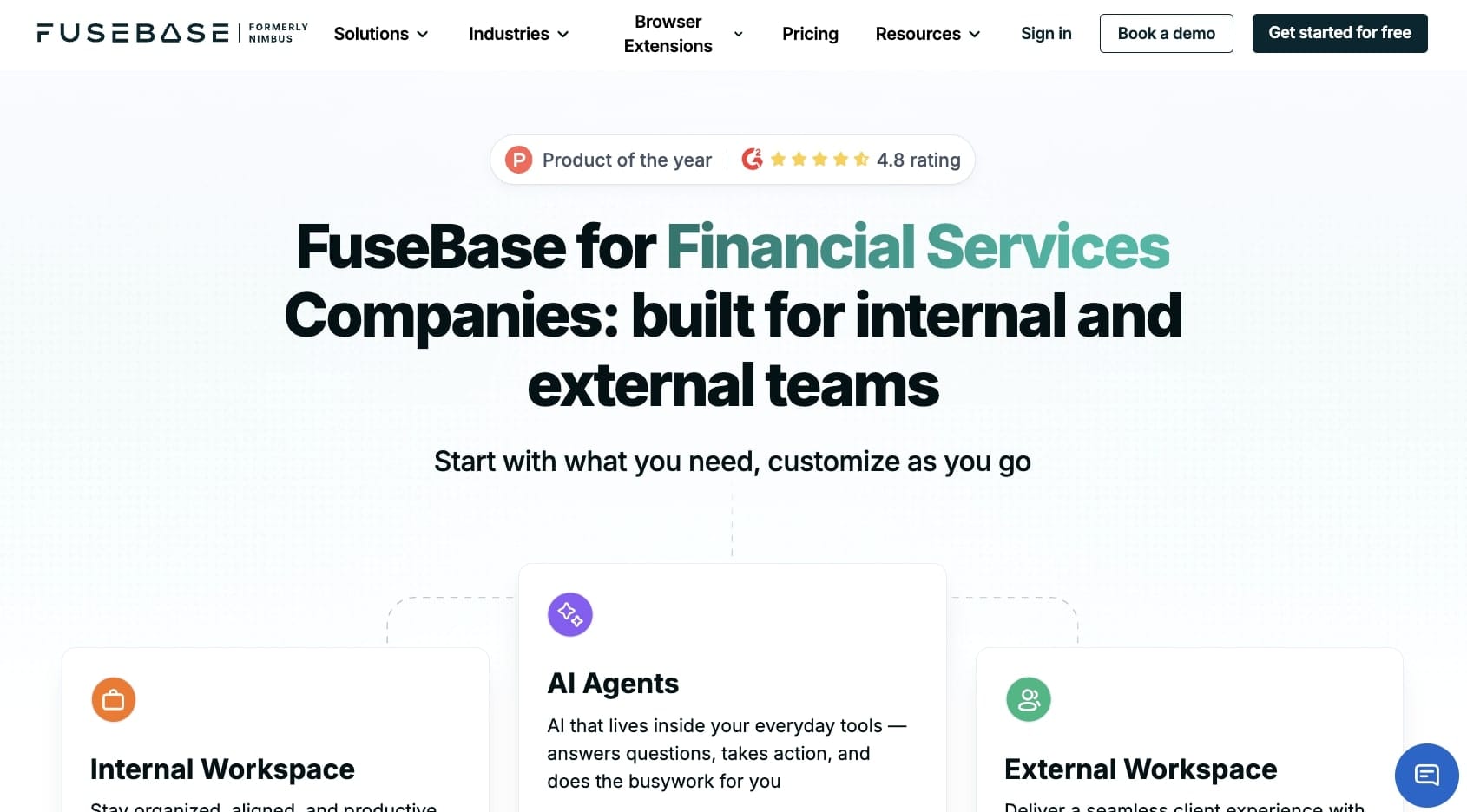
- Best for: Firms that want AI workflows
- Pricing: Starts at $39 per month
FuseBase (formerly Nimbus) is an AI-powered workspace for accounting firms. And honestly, they're onto something interesting.
The platform gives you branded client portals with built-in AI assistants that can answer client questions, pull up documents, and handle basic support tasks. They have pivoted a lot in the past couple years.
What FuseBase does well today:
- AI agents for document retrieval, client Q&A, basic automation
- White-label portals
- Deal rooms for pre-sales (if you're pitching new clients)
- Solid document collaboration and real-time messaging
- Integrates with 2,000+ apps through Zapier
The only concern is that it feels like they're still figuring out what they want to be. The interface can be confusing, and some users report that features they loved disappeared after the rebrand.
Also, their pricing structure is based on AI credits. So if you actually use the AI features they're promoting, costs can go up quickly.
FuseBase pricing
Here are FuseBase’s pricing plans:
- Solo: $39/month (1 user, 1 portal, 1,000 AI requests)
- Essentials: $99/month (5 users, 10 portals, 10,000 AI requests)
- Advanced: $332/month (50 users, 50 portals, 50,000 AI requests)
- Unlimited: Custom pricing
All plans come with a free trial. The Advanced tier adds white-labeling. For more options, check out their pricing page here.
FuseBase rating and reviews
Here’s how users rate FuseBase on third-party review sites:
- G2: 4.7/5 star rating (from +103 reviews)
- Capterra: 4.6/5 star rating (from +174 reviews)
11. Client Portal
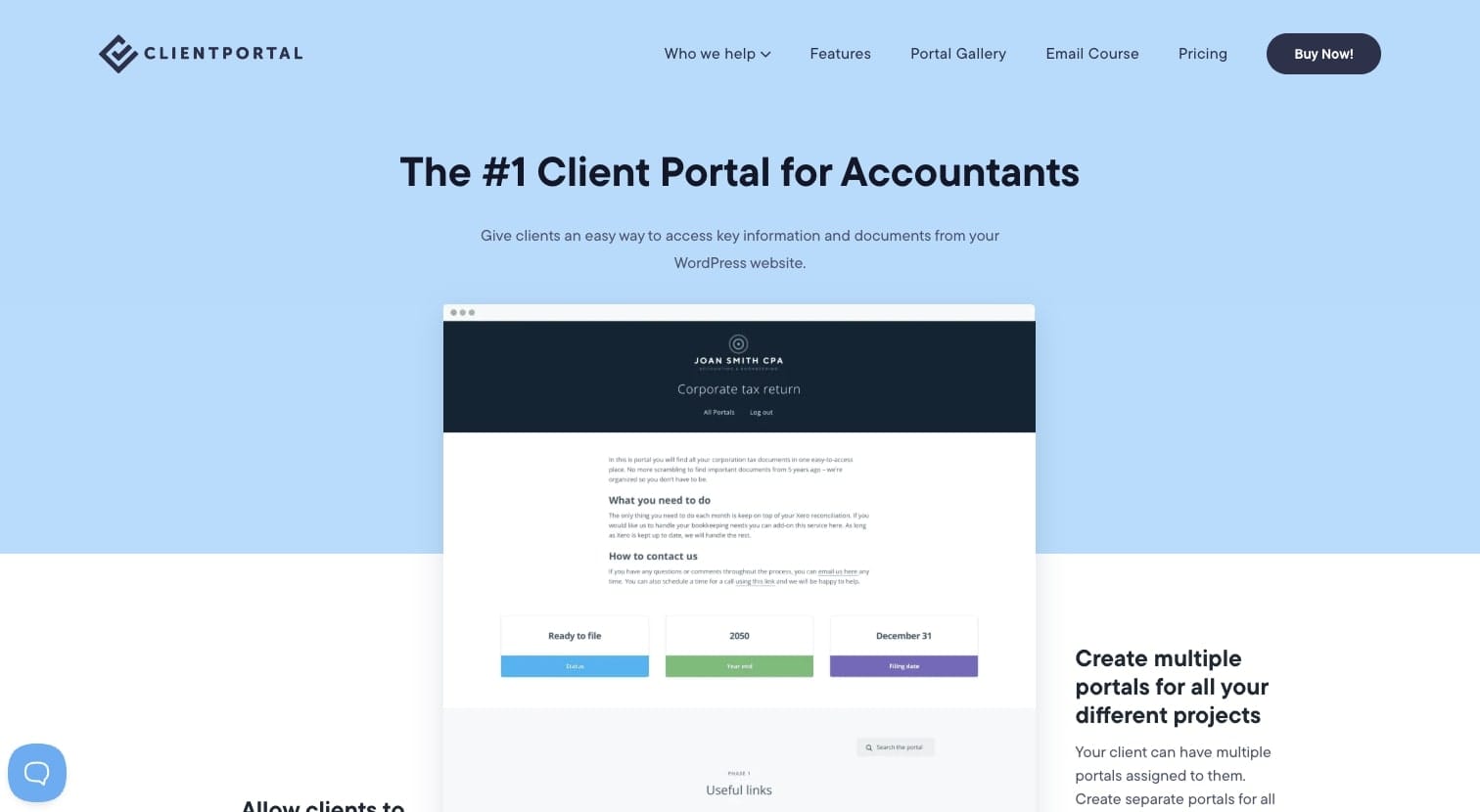
- Best for: Accounting firm websites that use WordPress
- Pricing: Starts at $199 per year
Client Portal is a WordPress plugin that lets you add secure, password-protected client areas to your website. Unlike most tools on this list, it’s not a cloud-based SaaS. You install it directly on your own site, which means you have full control over your data and hosting.
It’s a solid option for accountants who already have a WordPress site and want something straightforward without paying per user or per client. You can create unlimited portals and organize them by client, project, or service. The interface is pretty clean and simple, and because it’s self-hosted, you can customize it heavily with your own branding.
Some things I like about Client Portal:
- One-time setup on your own WordPress site (no monthly fees)
- Unlimited portals and clients
- Works with any WordPress theme
- Full control over client data since it’s hosted on your server
- Simple, distraction-free interface for clients
The trade-off is that you’ll need to be comfortable managing your own WordPress site, updates, and security (or have a developer who can help). You also won’t get native integrations with tools like QuickBooks or e-signature platforms without extra plugins.
Client Portal pricing
Here are Client Portal’s pricing plans:
- Single Site License: $199/year, unlimited portals & clients on 1 website
- Multi Site License: $399/year, unlimited portals & clients on unlimited websites
Both plans also include a 30-day money-back guarantee. You can learn more about what each plan has to offer on their pricing page.
Client Portal rating and reviews
Here’s how users rate Client Portal on third-party review sites:
- G2: 3.7/5 star rating (from +11 reviews)
12. FreshBooks

- Best for: Solo accounting and bookkeeping practitioners
- Pricing: Starts at $2.10 per month (first 3 months at 90% off)
FreshBooks is another client portal software similar to HoneyBook and Bonsai, but this time, it’s focused heavily on accounting and bookkeeping firms. While it’s best known as an invoicing and accounting tool, FreshBooks also gives your clients their own login to view invoices, estimates, project updates, and more.
For accounting professionals, it’s a convenient all-in-one platform that covers:
- Client invoicing (one-time or recurring)
- Expense tracking in real time
- Project and time tracking with billable hours
- Tax-time reporting and financial reports
- Payment collection via credit cards and ACH
- Proposal and retainer management (Plus plan and up)
What’s nice about FreshBooks is that it’s easy to set up and beginner-friendly, making it a good choice for solo practitioners or small firms who want something they can start using right away.
FreshBooks pricing
Here’s what FreshBooks’ pricing plans look like:
- Lite: $2.10/month for first 3 months (then $21/month)
- Plus (Most Popular): $3.80/month for first 3 months (then $38/month)
- Premium: $6.50/month for first 3 months (then $65/month)
- Select: Custom pricing, all Premium features plus lower transaction fees, remove FreshBooks branding, dedicated support, and migration help.
If you want to learn more about what each plan offers, check out their pricing page here.
FreshBooks rating and reviews
Here’s how users rate FreshBooks on third-party review sites:
- G2: 4.5/5 star rating (from +939 reviews)
- Capterra: 4.5/5 star rating (from +4,512 reviews)
13. Notion
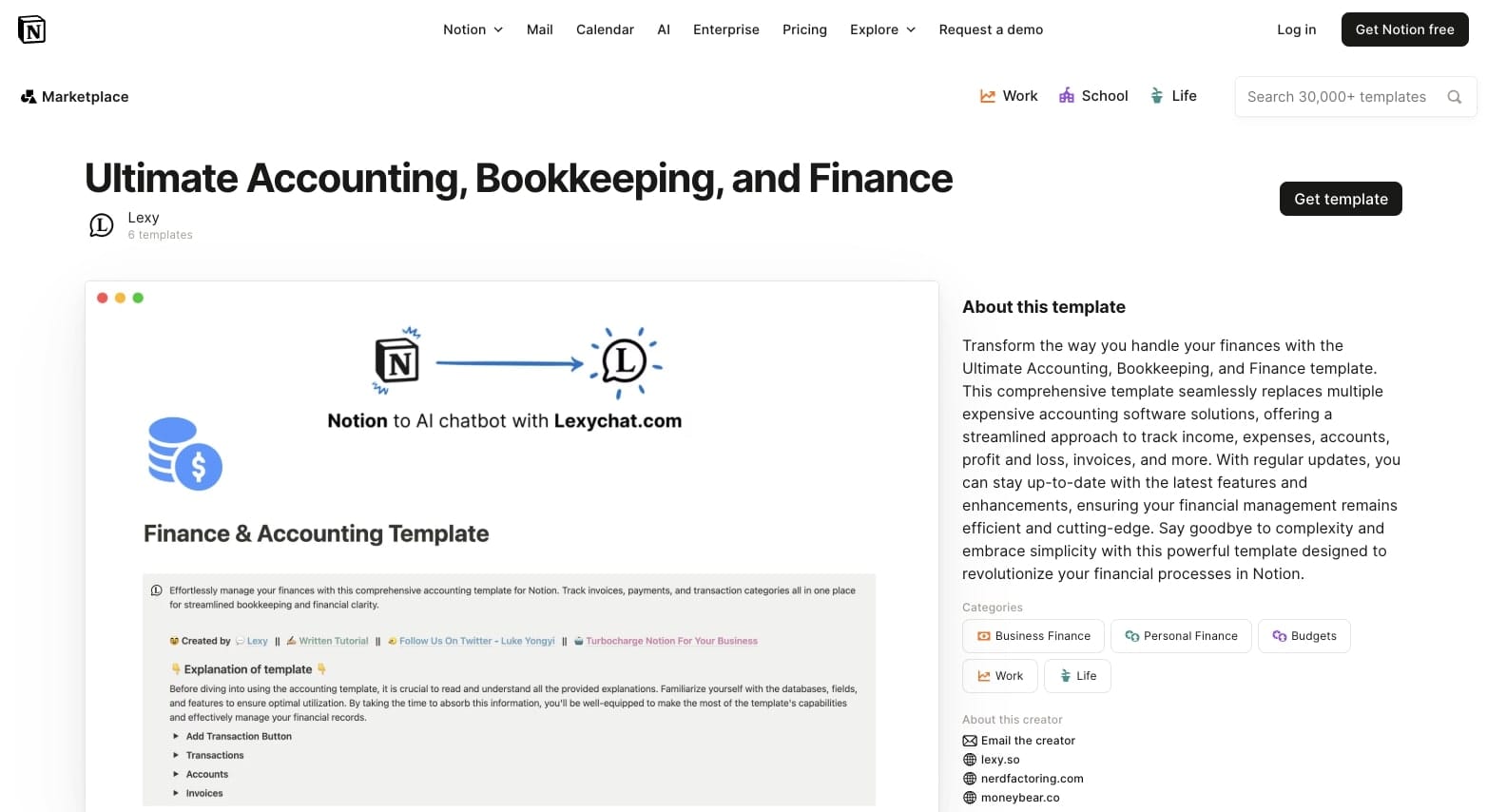
- Best for: Project management for accountants
- Pricing: Free
Finally, we have Notion. While it doesn’t look like an accounting tool at first glance, Notion is actually one of my favorite tools for managing projects with clients. It’s basically a blank canvas where you can build out anything you want (client dashboards, project trackers, accounting workflows, etc.).
If you like the idea of having a flexible, all-in-one space to keep client info, notes, task lists, and deliverables, Notion can work really well. The learning curve can be a little steep at first, but once you get the hang of it, you can customize it to do exactly what you need (minus the payment stuff).
A big plus is that there are already pre-built templates you can use, including some specifically for accountants. For example, the Ultimate Accounting, Bookkeeping, and Finance template gives you a great starting point for managing client books, tracking tasks, and organizing documents.
What I like about Notion:
- Total flexibility to design your own workflows
- Share pages or entire workspaces with clients
- Embed spreadsheets, charts, forms, and even other tools directly inside
- Use databases to track deadlines, invoices, and client deliverables
- Sync with Notion Calendar and Notion Mail for a more connected workflow
Notion pricing
Notion is (mostly) free to use. However, if you have a team, you may need to upgrade to a paid plan. Here are Notions pricing plans:
- Free: Great for individuals or trying out Notion before committing
- Plus: $12/month per user
- Business: $24/month per user
- Enterprise: Custom pricing
You can check their pricing page if you want to see all of the features in each plan.
Notion rating and reviews
Here’s how users rate Notion on third-party review sites:
- G2: 4.5/5 star rating (from +939 reviews)
- Capterra: 4.5/5 star rating (from +4,512 reviews)
Build a modern accounting business
If you made it this far, you know there are a ton of client portal tools out there. Some are built specifically for accountants. Others are more general but can be customized for your workflow. The important thing is finding one that’s secure, easy to use, and actually makes your clients’ lives easier.
And out of all of them. My favorite one is Copilot. They work with hundreds of accounting firms to help them scale their accounting practice. Everything from secure messaging, file sharing, invoicing, contracts, and more, is in one place. And you can bring all of your existing tools under one roof..
One of my favorite examples is Orca Accounting. Founder Leah McCool grew her client base by 4.5x in just seven months while cutting onboarding time by 75% and reducing email back-and-forth by 80%. She did it by moving beyond email and shared drives, and instead giving clients a professional, branded portal they actually enjoyed using.
That’s the real power of a modern client portal. You’d be surprised how much of an impact having a smooth, professional experience (that makes clients want to stick around) will have on your bottomline.
Hopefully by now, you have a good idea of what platform makes sense for you. Happy accounting!
Share this post
Sign up for our newsletter
Subscribe to our newsletter to receive emails about important announcements, product updates, and guides relevant to your industry.
